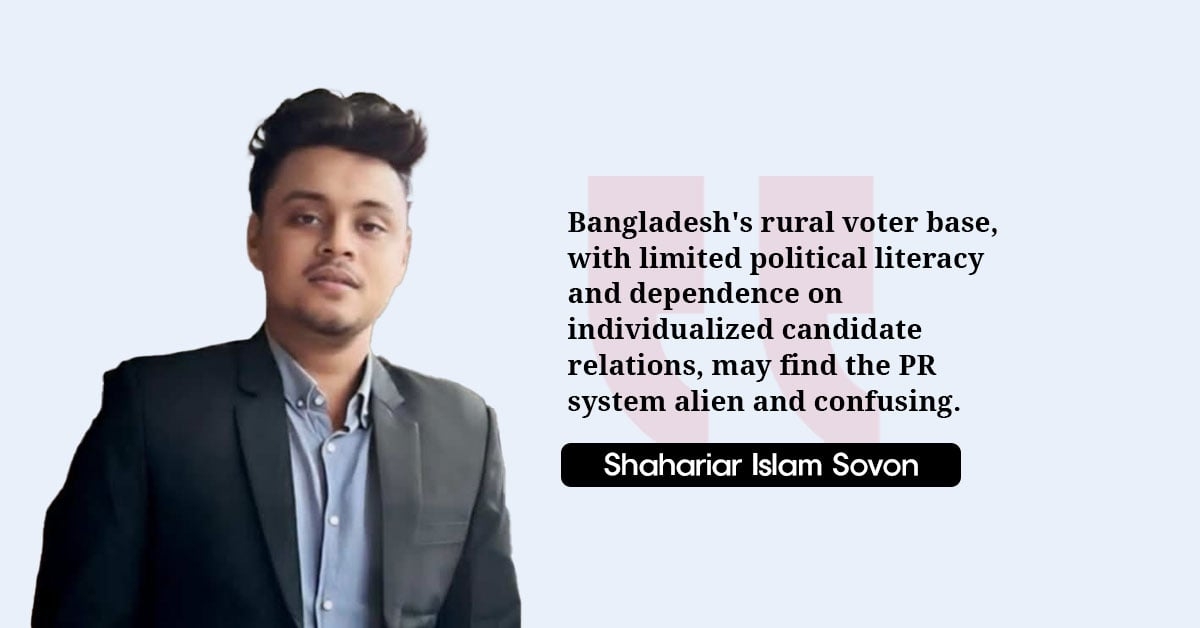

DHAKA: Bangladesh has grappled with turbulent transitions between civilian rule and military authoritarianism since its independence in 1971.
The first general elections in 1973 were held under the First-Past-The-Post (FPTP) system inherited from British colonial governance.
Life soon took a darker turn by 1975; former prime minister Sheikh Mujibur Rahman had suspended the Constitution and banned all opposition parties. This process effectively ended multiparty democracy within two years of the first Parliament. Subsequent decades saw further erosion of democratic norms, with multiple coups and manipulated elections.
The 1986 elections, organized under military ruler Hussain Muhammad Ershad, were widely condemned.
According to the British observers it was called a “tragedy for democracy,” with various allegations, including widespread ballot fraud and a boycott by major opposition parties.
The flawed elections persisted even after returning to civilian rule in the 1990s. In February 1996, the BNP government held elections widely boycotted by opposition groups; voter turnout plunged to below 15%, and the resulting Parliament lasted only 12 days before public outrage forced fresh elections.
In more recent memory, the 2014 and 2018 elections yielded sweeping victories for the ruling Awami League often with opposition boycotts or allegations of systematic malpractice. In 2018, the AL claimed an implausible 95% of parliamentary seats with only around 70% of the vote.
Thus, Bangladesh’s democracy has long been wounded by institutional fragility, electoral manipulation, and political polarization, not gaps an electoral formula change alone can correct.
At face value, Proportional Representation offers a more inclusive and vote-faithful method of seat allocation, promising fairer representation especially for minorities, women, and smaller or regional parties.
However, in Bangladesh’s highly polarized and institutionally weak political landscape, PR carries high systemic risk. Analysis voices that PR could give way to fragmented parliaments, unstable coalition governments, and policy paralysis.
Statistically, PR systems globally tend to produce a far larger number of effective political parties about 4.5 compared to around 2.5 under FPTP and coalition governments become the norm rather than exception. In Bangladesh, which has traditionally operated with strong two-party dominance, this sudden fragmentation could breed ungovernability.
In a nation where institutional capacity is limited, coalition governments often collapse or become mired in horse-trading. Bangladesh’s experience echoes other fragile democracies such as Nepal, which endured nine governments in eight years due to instability and fragmentation, stunting economic growth and societal cohesion.
Further, coalition deal-making can lead to budget concessions, frequent policy tinkering, and weakness in responding to crises.
The deeply ideological polarization between the Awami League and BNP means that coalition partners would struggle to find common ground. The process becomes a test of backroom power plays rather than voter-driven mandates.
PR systems, especially closed-list models shift electoral accountability away from voters and local constituencies to party leaderships. Bangladesh’s politics, already entrenched in patronage, may see local accountability further eroded: MPs beholden to party bosses over constituents, with positions won through loyalty rather than local service.
This centralization risks alienating rural voters who rely on constituency-based support and personal representation. Without direct linkages, local needs such as access to development and services may go unaddressed, aggravating voter disillusionment.
Moreover, elite capture within party lists could worsen: wealthy donors or factional loyalists might dominate candidate selection. In contrast to FPTP, this shifts undemocratic influence from the local to the national party level.
Bangladesh’s rural voter base, with limited political literacy and dependence on individualized candidate relations, may find the PR system alien and confusing. Rapid shifts could depress turnout, increase distrust, and exacerbate rumors or misinformation.
Observer
Moreover, implementing PR requires major administrative overhaul—redrawing districts, educating voters, introducing complex voting and counting mechanisms, and requiring constitutional amendments. Currently, Article 65(2) mandates single-member constituency elections, and moving to PR would require a two-thirds parliamentary majority, a political obstacle given current polarization.
The danger of prolonged political gridlock and weak coalition legitimacy is that it can invite external or military intervention.
A hung parliament could become a pretext for the military or other actors to reset governance—whether through caretaker administrations or direct control.
Other countries have seen such dynamics—fragmentation and incapacity leading to democratic backsliding and reversion to power-centric rule. Bangladesh’s history—from Ershad’s authoritarian interlude to prolonged rivalries demonstrates the fragility of democratic institutions.
Rather than a wholesale transition to PR, many experts advocate a mixed system or hybrid approach. For instance, adopting PR for a proposed upper house or geographically limited elections could balance representation with stability.
Another practical route would be gradual institutional strengthening, improving the Election Commission, enhancing civic education, and enshrining impartial caretaker mechanisms before introducing electoral formula changes at scale.
Building public trust and institutional resilience is more urgent than tweaking formulas.
Proportional Representation presents undeniable theoretical benefits: more accurate voter representation, inclusion of minorities, and mitigation of winner-takes-all distortions.
Yet, in Bangladesh’s fragile democratic ecosystem, PR could unintentionally erode governance stability, dilute accountability, heighten fragmentation, and open the door to authoritarian regression.
History has shown how electoral manipulation, institutional weakness, and political polarization have repeatedly derailed democratic progress and PR, rather than fixing these structural deficits, risks amplifying them. In such contexts, a bottom-up approach reinforcing democratic processes, building voter capacity, and strengthening institutions offers a lower-risk path to sustainable reform. Until then, introducing PR in national parliamentary elections remains a high-stakes experiment.